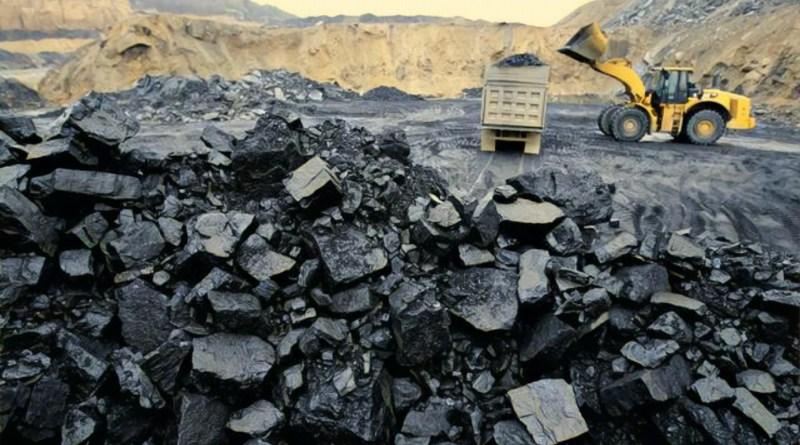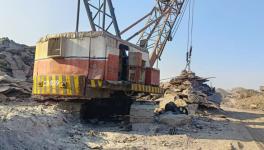Centre Launches Auction of Commercial Mine Blocks Amid Widespread Protests

As the Centre has kickstarted the auction of coal blocks, various people’s movements and rights organisations have continued to oppose the policy of commercial coal mining and auctioning of coal blocks, calling it a ‘direct attack on the constitutional rights of adivasis’.
On Tuesday, launching the virtual auction process for 41 coal blocks for commercial mining, which is expected to garner Rs 33,000 crore of capital investment in the country over the next 5-7 years, Prime Minister Narendra Modi said it is a major step in the direction of achieving 'self-reliance'.
The activists say that the policy of commercial mining will turn coal into a commodity, ignoring all concerns regarding coal requirement, environment, and social justice. It will not only damage the environment severely but will also impact the sustainable livelihoods of forest-dwelling communities.
A Supreme Court order has clearly stated in the past that coal is a national asset and people of the country are the “real owners”.
Opposing the commercialisation of coal blocks, a group of organisations has joined hands. Kisan Samiti, Adivasi Mazdoor Kisan Mukti Vahini, Jan Jagran Shakti Sangathan, Jan Abhivyakti Sangathan, Gaon Ganrajaya Sangathan, Dalit Adivasi Manch, Lokadhikar, Kisan Sabha, Visthapit Mukti Vahini, Kisan Sangharsh Samiti, Bundelkhand Mazdoor Kisan Shakti Sangathan, Adivasi Mukti Sangathan, Adharshila Shikshan Kendra, Adim Adivasi Mukti Manch, Grameen Shramjeevi Sangharsh Manch, Maati Maa Mahila Manch, Zindabad Sangathan, Hum Kisan, Khedut Mazdoor Kisan Sangathan, Awadh Peoples Forum, and Tharu Adivasi Mahila Mazdoor Kisan Manch among others, in a press statement, said that the central government has simply sidelined the ruling of the apex court and has put the future and wellbeing of the county in the hands of private companies. The stake of the states has been reduced under these policies, clearly indicating that a fistful of private firms are set to benefit in this situation.
Read more: Questioning the Death of Coal–I: Green Swan and Black Diamond
The adivasi and forest-dependent communities residing in coal rich dense forest areas will be most affected, facing a threat of displacement, added the statement.
Various government reports, Coal India Vision-2030, CEA plan, etc., state that no new coal mine allocations are needed for India’s coal requirements. They also point out that Coal India Limited is capable of fulfilling India's requirement of coal for the next 10 years with the existing infrastructure. This is said to be the reason behind the failure of the previous coal block auction which could not even muster the minimum bid. In some cases, even the successful bidders could not start mining. When the previous auctions have failed, allocated mines are not functioning, what is the point of these new auctions?
Activists associated with relevant movements explain: “Some changes have been made in the auctioning process to attract the same private firms which took part in the previous auctions. These coal blocks are not being auctioned for domestic development projects, but for the commercial use of the coal. It will allow private firms to gain profit without any control. This is an attempt to sell national assets to private firms.”
The mines included in the auction are located in India's most dense forests and environmentally significant areas. Many of these mines are in No-Go/Inviolate areas, which have been considered extremely important. Also, most of these mines are in tribal-dominated Fifth Schedule Areas where people have special rights under the Provisions of the Panchayats (Extension to the Scheduled Areas) Act, 1996, and Forest Rights Act, 2006.
“Most of the coal blocks have neither environmental nor forest-land diversion approval, nor a consent letter of the respective gram sabhas. In such a situation, it is certain that in the coming times, the crisis in these areas will worsen. If we look at the past experiences, then forcible and fake approvals can be made so that the path of mining can be cleared. It is clear that after this auction, tribal and other local communities will have to face the crisis of displacement,” added the press statement.
Read more: Questioning the Death of Coal–II: COVID Blackhole and Renewable Energy Future
Apart from gram sabhas and local communities, the chief minister of Jharkhand, too, has opposed this move and said that an overall assessment of these areas is necessary before the auction.
Many elected sarpanches from the Hasdeo Arand area of Chhattisgarh have already written a letter to PM Modi against the auction and have demanded a ban on mining in the area. The Hasdeo Arand area comprises three districts of north Chhattisgarh: Surguja, Surajpur and Korba.
Twenty gram sabhas of the region have been regularly passing resolutions against mining and auction/allotment of coal blocks in the region for the past five years. Even when the first phase of auctions was conducted in 2015, these gram sabhas had written to the PM duly forwarding these resolutions.
Read more: Questioning the Death of Coal –III: Asian Appetite for Black Diamond
Get the latest reports & analysis with people's perspective on Protests, movements & deep analytical videos, discussions of the current affairs in your Telegram app. Subscribe to NewsClick's Telegram channel & get Real-Time updates on stories, as they get published on our website.
























